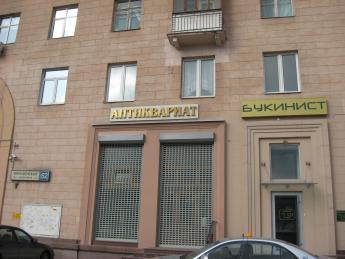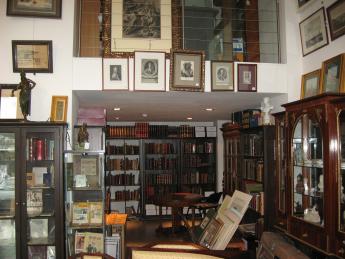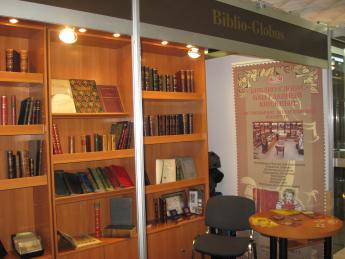Actualités Guild of Antiquarian Booksellers
Some Features of the Antiquarian Book Trade in Russia

By Olga Tarakanova
During the last 15-20 years Russia has experienced a significant increase of public interest in collecting antiques, including old and rare books, and as a consequence - intensive development of the antique trade. This is confirmed by numerous facts: increase of the number of antique shops and dealers; enlargement of their stock; improvement of traditional and development of new technologies of the trade; emergence of specialized periodicals on collectibles and antique trade as well as various reference books; publishing facsimile and bibliophilic editions, imitating the appearance of old books; sharp rise in prices for rare books, etc. Nowadays Russian antique dealers participate in the world's largest auction houses' sales and international antique fairs, focusing on European prices.
Finally, in 2009 the first professional association of antique book dealers – «Forum antikvarov-bukinistov» was formed here; Russia became a member of ILAB. Thus, Russia's antique book trade generally is developing in accordance with European and world trends. However, it has some features, which we'd like to draw your attention on.
The development of the antique book trade in Russia has traditionally been uneven, so almost all of the enterprises are concentrated in two «capitals» - Moscow and St. Petersburg, with the obvious advantage of the first. There are about 70 shops in Moscow dealing with antique books. Most of them (70%) work with books as well as with other antiques (paintings, icons, porcelain, jewelry, etc.). There are few specialized antique book shops here - not more than ten. Old books are also sold in specialized departments of the shops dealing with modern editions, among them the largest in Russia «Moskovskiy Dom Knigi» («Moscow House of Books»), «Moskva», «Biblio-Globus» and the shops from the trade system «Akademkniga» («Academic book»).
Old books in Russia are traditionally divided into two big groups depending on the time of their publication: the actual antiques and used books. The boundary between them is not constant, as determined with the participation of the state to streamline the pricing (in the Soviet period) or to prevent the removal of old books - the cultural values of the country - abroad. Today the border is set for publications whose age exceeds one hundred years. Books, issued in Russia more than a hundred years ago, are called «antique»; they are not allowed to export from the country. To export publications over 50 years a special permit is required. Most of the antique book dealers in Moscow prefer dealing only with expensive antique books, 40% - along with antique and used books.
Unlike many European companies, almost 70% of Moscow antique book shops and antique departments have universal stock. As to specialization, 14% of them prefer books on social sciences, 16% - military books, and to a less degree - books on medicine, theatre, the Far East, foreign editions or textbooks for learning foreign languages. There are only two antique shops in Moscow, specialized in engravings and maps - the «Albion Gallery» and «Antique salon on Bronnaya st.». All other Moscow companies have universal stock and simultaneously deal with books, periodicals, engravings, maps, autographs, etc. The largest antique shops in modern Moscow are «Moskva» («Moscow»), «Russkiy bibliofil» («Russian bibliophile»), «Vishnevy sad» («The Cherry Orchard»), «Russian avant-garde 1910-1930», «Chapkin's paper collection» and others. More than 70 % of the bookshops, wishing not to overstock, use «commission» as a form of trade (the owner of the book gets money only after the sale, and a specified percentage goes to the shop). Buying of books for cash applies usually to cheap used books, which are sure to be sold within a month, or on the contrary to rare expensive editions, which are extremely wanted by concrete customers or have good perspectives to be quickly sold.
The majority of the shops use this traditional way of buying and selling old and rare books. Not more than 10% sell books via auction. The largest auction house in Russia today is «Gelos», founded in 1988. It runs about 50 antique sales every year, including 10-12 book auctions. It has a number of branches in Russia and abroad, including London, Paris, Prague, Vienna and others, works with world famous auction houses «Sotheby's» and «Christie». In 2008-2009, despite the economical crisis, auction house «Imperia» («Empire») has successfully started its activity.
The Internet is becoming more and more important for Russian antiquarian book trade. But unlike in Europe its introduction here is much slower. Not more than a half of all the book shops run their own web-sites and only 10 % of them use the sites as an actual way of selling books. We can mention such important Internet bookshops as «Russkiy bibliofil» (www.rusbibliophile.ru), «Biblio-Globus» (www.bgshop.ru), «Sredi collectsionerov» (www.bukinist.su), etc. One of the largest antique book shops, existing on the Internet only, is «Rarebooks» (www.rarebooks.ru).
Since 1996 the «Russian Antiquarian Salon» has become an essential part of the antique trade of the country. It is the largest Russian antique fair which is run twice a year (in October and February). Unfortunately its book stock has become poorer year after year. Since 2005 the «Flea market» fair has been held four times a year in the center of Moscow. Except different antiques the participants also offer postcards, inexpensive prints and books, securities. But the main event for Russian collectors and book-dealers is the «Antique book fair», since 2005 annually taking place at the Central House of Artists on Krymskij val - the largest specialized exhibition complex in Moscow. Nowadays the fair includes about 30 participants among which are found the largest antique bookshops in Russia. Different activities take place during the fair: round tables on issues of pricing, staffing and other vital issues of the antique business, presentations of new reference books, bibliophile and facsimile editions, interesting for both professionals and the public.
We'd like to say a few words about the range of Russian antiquarian book trade, which is ruled by the laws of the market and is largely determined by the change of the type of book customer, occurring within the last few years. The main customers in Russia today are mainly young businessmen which have taken over from the traditional customers of the Soviet time - scientists and so called «intelligentsia» (intellectuals). The process of starting future family and corporate collections is now beginning, old and rare books are often being bought as gifts. So what's the most desirable and therefore the most expensive type of book in the modern Russian antique book market?
- editions on «Russian royal subjects», including coronation albums, books on hunting and other activities of Russian tsars and emperors;
- the first lifetime editions of Russian classical writers;
- gift and large-size editions of Russian and foreign classics, released at the turn of XIX-XX centuries by well-known domestic firms of M. Volf, A. Marx, A. Suvorin, I. Sytin and others with wonderful illustrations by the best artists of the time;
- military editions, for example the histories of the regiments of the Russian army;
- Russian avant-garde books of the first third of the XX century, which are quite rare;
- editions from famous Russian catalogues of «book rarities»;
- engraved views and plans of Moscow and St. Petersburg XVIII – first half of the XIX century, etc.
One of the most expensive books in the modern Russian antique market is the first edition of A.S. Pushkin's «Eugene Onegin» (8 chapters in wrappers, 1825-1832) - it is estimated at 1.5 million rubles (about 50 000 $). In the same high price category we can also mention one of the most sumptuously decorated Russian books «History and Monuments of Byzantine enamel», based on the collection of A.V. Zvenigorodsky (1892). It was published in 600 copies in three languages - Russian, French and German. One of the French copies was sold at «Christie» auction in 2008 approximately for 50 000 pounds (2 300 000 rubles). The least interesting division in the modern Russian antique market are religious books, which appeared in the bookshops shops only in the post-Soviet period, as well as editions in foreign languages.
It is impossible to characterize all the features of Russian antiquarian book trade in a brief article, that's why we focused only on the most important of them based on historical development of Russia's culture and book business. We didn't touch the last changes of antique book market caused by the economical crisis as it's the topic of separate discussion. In our opinion, Russia's first professional association of antique book dealers should step forward now. It's considered to protect book-dealers' interests in front of the government, develop their relationships with the customers, encourage development of the special education in the field of antiquarian book trade, organize exhibitions and fairs, publish new and reprint fundamental reference books, etc.
Olga Tarakanova is Professor of Moscow State University of Printing Arts, Doctor in History. Her article is published here by permission of the author.
More information
Forum Antikvarov Bukinistov (FAB)
China and Russia admitted to the World of Rare Books


